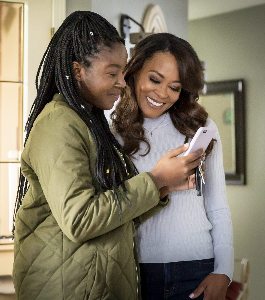TV Interview!
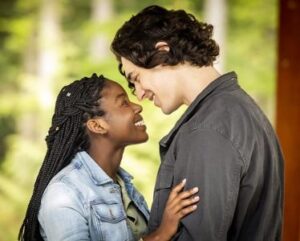
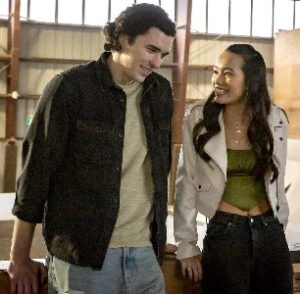
Interview with Hilda Martin, Lachlan Quarmby, and Rachel Boyd of “He’s Not Worth Dying For” on Lifetime by Suzanne 6/1/22
This was from a press day featuring three “ripped from the headlines” movies airing this summer. It was great to speak with these young actors. I only wish star Robin Givens had been there.
MODERATOR: Hi, everybody. Our next panel for today is the talented cast of “He’s Not Worth Dying For.” Please welcome Hilda Martin, Lachlan Quarmby, and Rachel Boyd. Hi, you guys. Thank you so much for taking the time to be with us today.
LACHLAN QUARMBY: Thank you. Happy to be here.
RACHEL BOYD: Thank you.
MODERATOR: Our first question is from Jamie Ruby.
QUESTION: Hi, guys. Thanks for talking to us. So how familiar were you all with kind of this story and kind you talk a bit about sort of the research that you did into it for all of you?
LACHLAN QUARMBY: Sure.
RACHEL BOYD: Do you want to start?
LACHLAN QUARMBY: You go, you go.
HILDA MARTIN: Well, I didn’t know much but I do have a liking for crime documentaries, so as soon as I got that and was told it was based/inspired by true stories, as a true story, I Googled it right away, but before then I had no knowing of the story.
RACHEL BOYD: Yeah. I think that like for me when I first got the audition script I actually somehow missed the words “based on a true story” when I was reading the description of it, so I had no idea until the callback that I was auditioning for something that was based on a true story, but I think, for me, like, seeing the sides and the character, I really connected to it, because it’s such an experience that a lot of young people on social media, and especially young women can relate to in how we are taught to, like, compete for a man’s exclusive love, and then how that manifests in different ways in the age of social media, and how that has real effects on our self-wroth and the way that we behave as people and change our character.
LACHLAN QUARMBY: Yeah, I hadn’t heard of it at the time. In 2009, I was living in Canberra, Australia, which might as well have been about as far away as you can be. But, yeah, I was the same, as soon as I got the script and heard it was a real story I looked it up and had such like an emotional reaction to just how much of a tragic experience it was and, yeah, it was kind of exciting to get to audient to play something like that.
QUESTION: Great. Thank you so much.
LACHLAN QUARMBY: Thank you.
RACHEL BOYD: thank you.
MODERATOR: Thank you. Our next question is from Tamara Rollins.
QUESTION: Hi, guys. Can you hear me?
LACHLAN QUARMBY: Hi.
RACHEL BOYD: Yes.
QUESTION: Hi. So nowadays social media can be used as a tool to destroy lives. Some people tend to separate social media from our actual lives. They deem it as two separate entities. Do you guys feel that social media in our real day-to-day lives are one entity or two separate worlds?
RACHEL BOYD: I would say that I think that social media is real but also fake, because what it is is it’s taking a person and letting them choose what they want to highlight and choose how they want to be perceived in the world, and what you see on social media as much as we often treat it, like that is that person and that is the full representation of them, it’s not a real accurate representation of a person, of a real human being who is full and flawed. So I think that they’re different in that way, but the really unfortunate thing and kind of what we wanted to tackle in the movie is that people blur those lines together, and they treat people like they aren’t really human beings on social media when it really is really us. We’re just kind of creating a highlight reel.
QUESTION: Thank you.
LACHLAN QUARMBY: Yeah. I’ll add to that. I agree. I think that a lot of people out there are probably having this sort of duality in personality versus real life on social media, but it’s not for me to say as to how you should manage it. I personally think that it’s best to just do everything in moderation. You know, if you are going to put something up there that is a version of you that may not be the exact version of yourself then it can be the kind of thing that you’re aspiring to be, or the kind of person that you’re trying to be like, but it’s just managing which is which and just being like honest with yourself. As long as you know what you’re all about and stuff like that then I think it’s manageable.
QUESTION: Thank you.
HILDA MARTIN: I think the same thing. I specifically had a hard time with kind of splitting — with kind of being the same person and having like a reality, being real on social media for the longest, and I don’t see that be a possibility now because you’re still — Like in social media you’re not you. You’re never going to be. You’re going to be torn apart, if you want like an extensive amount of people kind of following you, unless you just want yourself and close friends, but other than that it’s like you have to be someone that society wants on social media. So that’s like totally different, and I could see the same for Isla, who is trying to kind of be this person and this colorful person, this bright person, but on the other side in her real life it’s the total opposite, so totally different.
QUESTION: Thank you.
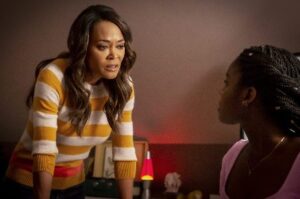 MODERATOR: Thank you. We also have some pre-submitted questions from journalists who could not be here today. This question is for Hilda. Hilda, you have some pretty intense scenes with Robin Givens who plays your mother in the movie. What was it like working with a veteran actress, and did she give you any advice or were there any fun times together on the set?
MODERATOR: Thank you. We also have some pre-submitted questions from journalists who could not be here today. This question is for Hilda. Hilda, you have some pretty intense scenes with Robin Givens who plays your mother in the movie. What was it like working with a veteran actress, and did she give you any advice or were there any fun times together on the set?
HILDA MARTIN: It was great working with Robin. I think like she kind of let me — She didn’t really — You know, working with a veteran and you’re not one yourself, you kind of feel like you’re not good enough, but there’s a lot of moments where she kind of like, A, gave me tips on certain scenes and, B, kind of like applauded me for certain scenes, and kind of like validation, which I like, but there’s quite a few moments that she kind of made me laugh, and one of them was Grace is being a bitch to, like harsh mood to her mom, and as soon as the scene got cut she was like I would have whooped you in real life. I would have whooped you hard. Never do that to me in real life. My kids would never. And another scene was with Jake, Lachlan, and it was a family dinner and like you just never know when stuff happens. She had like this, she had a green bean that she was chewing mid-scene, and it was her turn to talk, and like it wasn’t going down, so like that cut was like the funniest part, because we’re just watching her chew. She’s like (imitates chewing), mm um hm, um hm, one sec, um hm.
(Laughter.)
HILDA MARTIN: And she hadn’t thought of like — She is fun. She’s great to work with. She’s like a mom. She was actually like a mom and, yeah.
MODERATOR: That’s awesome. Thank you, Hilda. Our next question is from Suzanne at TVMEG.COM
QUESTION: Hi, I was wondering if any of you had done any Lifetime movies before and whether you could compare them to other work that you’ve done elsewhere — whether they were slower or faster or what other things you can think of that would be different?
LACHLAN QUARMBY: Yeah, I had a small role on like a Christmas one before. So it was kind of fun to play the differences in tone in terms of like the sort of lighter Christmas one and then the darker reality of like this one. I really enjoyed it, the mixing up, because it is a different way to come about it from an acting point of view in terms of like the tone, the network, and like the genre as well. You got to play with all of those elements, and I have no idea what I’m doing typically, because it’s so early on. So it’s really funny to have like a producer or a director just say, like, “Hey, like this is actually more the way that it is done for this type of film,” and I was always like, “Oh, cool. Great.” That’s awesome to learn and use going forward, yeah.
RACHEL BOYD: Yeah. I also think that, I mean, personally, I hadn’t done anything, any other work with Lifetime before, but I also think it’s so interesting to mention that this was mine, Hilda’s and Lachlan’s, all of our first lead roles in a feature-length film. So that was really, really fun, and it was really great to experience that with the three of us. I think that all of us ending up being our first time really brought a new energy to the set that we really liked where we were just very eager to work and play and have a lot of fun with each other. So I had to mention that.
QUESTION: Great. Hilda.
HILDA MARTIN: It was also my, yeah, my first time as well. What I would interesting, what I like to find out is like what does Lifetime like cast to wear, and like the other show that I’ve done was a different wardrobe and seeing like how characters are kind of like created, developed like look-wise on different platforms like Lifetime, for example. That was cool. But like also the first time in having like a great cast to work with.
RACHEL BOYD: Aw.
HILDA MARTIN: It kind of made it exciting and easier, I think, something you (inaudible @ 00:34:14), so, yeah.
QUESTION: Well, thank you.
HILDA MARTIN: Thanks.
LACHLAN QUARMBY: Thank you.
MODERATOR: Thank you. Our next question is from Mike Hughes.
QUESTION: Yeah. I wasn’t sure if my mute — can you hear me now?
GROUP: Yes. We can hear you.
QUESTION: Okay. Cool. Rachel, actors obviously have to be able to turn it on quickly when the camera is on, but it’s much more so what Isla had to do, because just you’re solo on a camera and (just be big @ 00:34:40) the moment she goes on. So what’s it like to do the scenes where Isla is really over the top and on her own before a camera?
RACHEL BOYD: Yeah. I think that’s something for me that I really did a lot in preparation for the role was learning exactly what that physicality was, because I knew that Isla’s character needed — She needed to be able to walk into a room and command it and hold the power in it just with her body and how she moved around, so that was kind of something I really wanted to focus on. And, yeah, that just came through I think sometimes if she was putting on the performance of like “Influence Isla” then it was a lot for me finding those places in my body where that energy was. Like I think there’s like a scene at the beginning. Hilda and I were talking about it the other day, but it’s like she’s walking into the store, and she’s kind of doing like this crazy like “Clueless” walk, and it’s just I think it gives me that energy from within me instead of me keeping the same body language the entire time. And then I also liked working with the physicality, because it gave me space to also be Isla when she’s not being big and over the top, and she’s just being, you know, a regular girl who’s just lonely and confused, and how does her body change. And then I think having that like drastic difference helps, too, when you saw her being bigger.
QUESTION: Cool. Thanks.
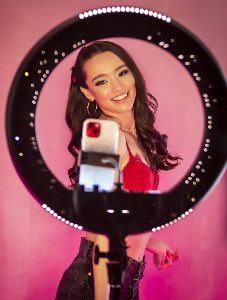 RACHEL BOYD: Thank you.
RACHEL BOYD: Thank you.
MODERATOR: Our next question’s from Cynthia Horner.
QUESTION: Hello. My question is for all of you. I really enjoyed the film, and I’d like to know what advice would you give to young people that are watching — They’re going to be watching the film, and we all know people who’ve been in similar situations even though the ending may not be the same, but the fact that there are so many situations where people are being cheated on or whatever, so can you each talk about your character and the way those dynamics were so that other people that are watching the film may decide not to make some of those mistakes.
RACHEL BOYD: Yeah. I can start. Are you guys —
LACHLAN QUARMBY: Go for it, Rach.
RACHEL BOYD: Okay. I think, for me, I’ve always, always wanted this to be the message that people take away from the whole movie, and with Isla especially is that there’s no manifestation of love or validation, be it like a boy or followers and likes and comments on Instagram that is ever worth losing yourself for and affecting your own self-worth to please. I think I want people to know that they are one hundred percent significant and one hundred percent enough just in themselves, and that outward validation will always come and go, but that it really is that inner self-worth that you should focus so much of your energies on. Yeah.
QUESTION: Good answer.
HILDA MARTIN: Yeah, I’d go with the same. I think for me it was value. I think we all, like the whole cast, like all three of us wanted to feel valued from social media, from a boy, but relationship-wise, I think that like what I want people to know, because like, again, nearly all of us have gone through it, it’s like not forgetting our worth, not feeling that we need someone else, and that could be a male or a female in a relationship, remembering your worth, and if you’re not receiving that worth it’s, as hard as it is, it’s just like let go, and when they say love is blind they also mean love is also deaf, because a lot of times you’re also told and you can hear the words, and I just hope that they remember how like valuable and like worthy they are, yes.
QUESTION: Okay. Thank you.
LACHLAN QUARMBY: Yeah. I would also just add that I agree with everything the girls said there but, you know, I think it’s in the title, right? It is a cautionary tale. That’s what we’re hoping people will take away is that it’s — and most of it is just not worth it. Even a lot of the stuff that seems really important at the time and seem so like at the forefront of your life, because it’s at your fingertips on that device, on that social media platform, it just seems like it’s so much worth it, but if you just put it down, and you take a step back, then it’s probably not going to be worth all of this pain or bleeding into your real, you know, personal life and causing you anxiety or whatever. And, I mean, for Jake, it’s the whole thing is just he brings all these problems on himself and stuff like that, and he doesn’t really have a support network around him to tell him like, “Hey, like you’re basically you’re being an idiot.” Again, flipping through the script, the first time I read it being like, you know, you’re not supposed to judge a character but idiot, dumb ass, that’s stupid —
RACHEL BOYD: He makes it hard.
LACHLAN QUARMBY: What are you doing? What are you doing, man? Somebody just needs to tell this guy, please, stop, stop doing these things. So I hope that people take away from that, that you need to help yourself but may also people who are close to people witnessing them going through stuff like this that you can also step in and help them with that as well. Yeah.
QUESTION: Fantastic answers. Thank you so much.
RACHEL BOYD: Thanks, Cynthia.
LACHLAN QUARMBY: Thanks.
MODERATOR: Our next question is from Steve Gidlow.
QUESTION: Hey, everyone. Just I’m assuming you’re all on social media. So I was just wondering if being so immersed in the darker side of it, did it change your perception of how you deal with your own social media now?
RACHEL BOYD: something that I really like about the movie is that we’ve all been living in the dark side of social media, all the time. What this movie does though is holds up a mirror to the reality that we’ve been living in and how we reduce people and their self-worth and value to their viral abilities and how we turn real human suffering into its own like entertainment genre on social media, and it’s really horrible, and it’s something that everybody who’s on social media is immersed in one way or another. But what the movie does is it holds up a mirror to the realities of that and how those facets of social media have real-world repercussions on people, and their lives and their feelings.
LACHLAN QUARMBY: I would say that, for me, personally, the changes that I’ve made it’s just made me more conscious and more aware of purpose and point behind posts. Like why am I actually posting this, and I’ve stopped myself a couple times being like is this for me? Is this something that I like? Or is this actually for other people? Is this to get a reaction out of other people? Is this to make people feel a certain way about me and, at those points, I stop. So I’m just trying to be posting more positive stuff. You know, sometimes it’s cheesy, sometimes it’s silly but I’d rather put —
RACHEL BOYD: Sometimes it’s a dance.
LACHLAN QUARMBY: These guys make fun of me all the time but that’s fine. I’d rather post something that’s a bit cheesy and a bit more positive than something that was coming from the wrong place in my heart, I guess. So, yeah, I’m more conscious of that.
QUESTION: Gotcha. And Hilda.
HILDA MARTIN: It just, for me, it validated the change that I made before the movie of like just not giving in to like being that person, like that perfect person on social media and kind of giving in to the dark social media side, but — Because, again, there are — After the movie, obviously, there’s people who are going to be look at our social media and like kind of giving that image of me being perfect is not going to be the message I was kind of like that people — wanted people to take away from the movie itself. So kind of just of I did make a change, and I was kind of proud of that, and just loving myself, posting whatever I love whether it’s like a picture of a flower or just me unedited, hopefully.
QUESTION: Thank so much.
HILDA MARTIN: (Inaudible @ 00:43:25).
QUESTION: Thanks.
HILDA MARTIN: Thanks.
MODERATOR: Thank you. Our next question is from Luaine Lee.
QUESTION: Yes. Part of the danger of social media is rejection by your peers, but acting is involved with total rejection all the time. So I’m wondering how do each of you cope with the rejection that happens to you when you’re trying out for roles?
RACHEL BOYD: That’s a great question. Hilda, do you want to start?
HILDA MARTIN: Sure. Well, I’m pretty new to the industry, so I was researching a lot of like veteran actors and their comments on the whole industry, and the one thing that they mentioned is never take it as — Like always take it with a grain of salt, and so whenever I do an audition I like — like with this one, I — because I did watch the documentary before like right when I was auditioning, so I did see that it was a girl of not my shade, like white, Caucasian, so I knew I wasn’t going to get it. So it’s — I go in just giving my agents what they want without knowing what I’m going to get back, so I think I already implemented that in my head and not getting it doesn’t sting as much as other people — as it would other people but, yeah, I kind of like already ingrained it, “I’m not getting it.” And when I do it’s like cherry on top.
QUESTION: Great. Rachel?
RACHEL BOYD: Yeah. I think, you know, this kind of takes me back because Lochlyn Munro is in the movie as well, and the day that he was on set he was giving all of us young eager actors with big ears like advice about the industry, and something that he said in relation to auditions specifically that really resonated with me was he goes in when he gets sides, and he says, “I want to land the character. I don’t want to land the role.” Like his first priority is land the character and, for me, that really made me feel better, because then it takes the pressure off of it, and it just becomes this thing that I do because I love it, and it’s my craft, and it makes me feel so happy, so getting sides now since speaking with Lochlyn Munro and just seeing it as how do I give this character all of the emotional empathy that I can to claim them and have that be as true and honest to me as possible, and then when I do that, and I can watch it back and feel proud of myself that it — I’m working on that being enough satisfaction for myself and not depending on all of my happiness on like what a third party will think of it, and just kind of focusing on like being proud and celebrating little wins even if they don’t result in a job.
QUESTION: Lachlan?
LACHLAN QUARMBY: Yeah, look, in high school I was rejected by a few women, so I think that actually was good practice to set me — I say a few. It was all of them in high school. So, you know, it’s just you take it, you learn from it. When I submit an audition I just forget about it straightaway. It’s just, it’s gone. You just go in, be yourself, do your best. I was quite similar to Hilda. You know, when I got this and looked up the real person I was like, “Yeah, that is not me at all, so I’m just going to do something and send it, and then just completely forget about it,” and that way you’re not waiting by the phone, you know, and because that’s really when you suffer twice when you wait and you worry and all of that sort of stuff. Sometimes it’s easier said than done. Like I’m not going to lie. Sometimes the rejection does affect you personally, and it can hurt. But it’s all about, I think surrounding yourself with the right people in your personal life, friends and family and stuff, keeping your head on your shoulders like nice and straight and everything, and you just keep going because eventually, you know, good things will happen. It’s meant to be.
RACHEL BOYD: Yeah. And, Lachlan, now look at you. You’re in a movie, you got two girlfriends, so. And they don’t want to reject you. So you’re doing —
LACHLAN QUARMBY: That was the whole —
RACHEL BOYD: It’s like quite full circle for you.
LACHLAN QUARMBY: It’s a perfect opportunity, yeah.
RACHEL BOYD: perfect. A big slap in the face to those girls. Look at him now, (laughs.)
LACHLAN QUARMBY: I’m going to link them. I’m going to send them a link to it, yeah.
QUESTION: Thank you.
MODERATOR: Thank you, everyone. That’s our time for today.
RACHEL BOYD: Thank you.
MODERATOR: Thank you to Hilda, Lachlan, and Rachel for being here today, and everyone please tune into “He’s Not Worth Dying For,” Saturday, June 25th at 8/7 Central.
RACHEL BOYD: Yay.
LACHLAN QUARMBY: Thank you.
RACHEL BOYD: Thanks.
MORE INFO:
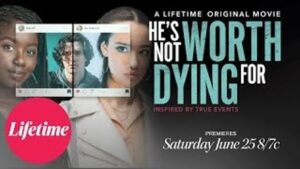
Inspired by a true events, He’s Not Worth Dying For follows the intertwined real and social media lives of Isla (Rachel Boyd), a 19-year-old girl who has established herself as a beauty and fashion influencer and Grace (Hilda Martin) the expected valedictorian of her class with hopes of a veterinary career. Though both are very different, they unknowingly share one thing in common – Jake (Lachlan Quarmby) – who is dating them both without their knowledge. When Isla and Grace discover that Jake was cheating on them, the girls turn on each other in a jealous rivalry and use their arsenal of social media platforms to badmouth and attack one another. While their followers take sides and pit them against each other, their hatred for one another escalates into a real life fight that ultimately turns deadly. Robin Givens stars as Grace’s mother, Cher, while Lochlyn Munro stars as the District Attorney investigating the case.
He’s Not Worth Dying For is produced by Doomed Productions Inc for Lifetime with Tim Johnson, Orly Adelson, Stacy Mandelberg and Jon Eskenas serving as executive producers. Kevin Fair directs from a script written by Jacqueline Zambrano.
Proofread and Edited by Brenda
Back to the Primetime Articles and Interviews Page
